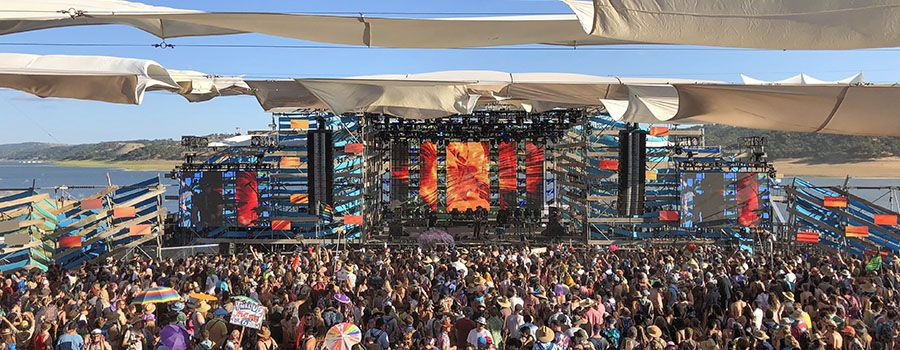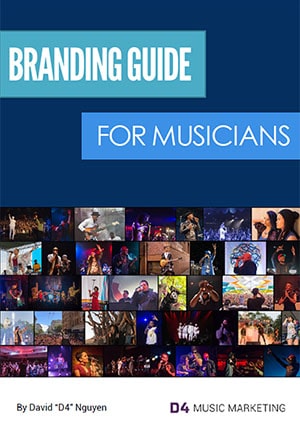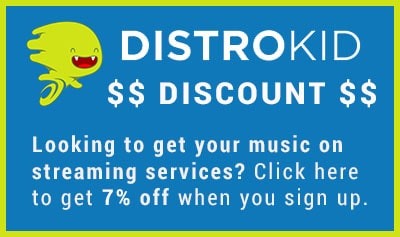
This blog was last updated October 4, 2023.
Are you a new musician still trying to decide on a stage name? If you’ve been having trouble, then hopefully this blog can help.
Unless you want to perform under your given name, you should devote a considerable amount of time researching and strategizing what your stage, artist or band name should be. For a new musician, choosing a name to perform under may not seem like that big of a deal. However, you can avoid a lot of potential headaches down the line if you invest the time to research your preferred stage name.
A frustrating issue you may run into if you don’t do your research first is having to change your name. It can be a nuisance if you’ve invested a lot of time and money into an artist name, only to have to redo your efforts because of poor planning. You may have to change your name if you:
- Find your name and online assets are already being used
- Have a name that gets confused with other artists, businesses, products or organizations
- Realize your name is a trademark
Even having an artist name other musicians are already using can be annoying when releasing music. A common issue on digital music platforms like Spotify or Apple Music is having your songs mixed up with another artist profile using the same artist name or vice versa.
You may even realize many years later that your artist name doesn’t truly reflect who you are or represent your brand. It would be a massive hassle to change it and re-brand yourself.
To avoid these potential problems, follow the steps in this blog before finalizing your stage name.
Why is a good stage name so important?
Aside from a way of identifying you and distinguishing yourself from others, a stage name helps to establish expectations about your music.
You may not judge a book by its cover, but people will judge you based on your artist name, more often than not, before they even hear your music.
The stage name you decide to go with is symbolic of your brand. This brand is the public persona you project based on some aspect of your personal identity. Ultimately, a well-chosen artist name will support your brand and effectively communicate what you, as a musician, represent and what makes you unique. The name chosen to represent your musical endeavors should be part of a cohesive branding and marketing message. You want this name to set the right expectations.
For example, what type of music would a band that goes by the name The Grim Reapers perform? It would be very unexpected and odd if they recorded gospel or sugary pop hits. If The Grim Reapers sounded like a tween pop group, their band name would in no way align with the message it implies (dark, scary, possibly sadistic). Likewise, know that you will have to live up to your stage or band name. Having a good name will help set the tone for what listeners can expect from your music.
Now that you understand the importance of coming up with a stage or artist name that is relevant to your brand, here are the steps you should go through to come up with the perfect name.
Step 1: Brand Assessment
Before brainstorming names, it’s important that you take a self-assessment regarding who you are as an artist and how you want to be portrayed in the public. It is essential to establish your brand to help listeners distinguish you from other musicians out there and make you more identifiable.
If you have read any of my other blogs, you know how important branding is for a career in music. Everyone is going to perceive your brand a little differently, but your stage or artist name will help solidify the persona you are trying to project.
What Does Your Brand Represent?
When you are determining what characteristics will be a part of your brand – southern charm, hardcore lyrics, pot head, feminist, vegan, political, rags to riches story, etc – know that you will be expected to live up to these characteristics, because it’s how people connect with you.
So while it may seem enticing to write songs about events that haven’t happened to you (but you think your audience will relate to), it will be difficult to maintain that brand or persona long-term. This is because it is essentially a lie. Think Jamie Kennedy in Malibu’s Most Wanted.
What you should do is think about what makes you unique, and capitalize or enhance those traits. The characteristics that set you apart don’t have to even be that extraordinary. For example, someone used their birth name that is spelled offbeat to come up with the stage name Jef with an F. It’s a real plus when your name describes something that is meaningful to you (especially you are going to be asked about your name approximately 99,999 times). In this respect, choosing your stage name is akin to getting your first tattoo.
Tell Stories (Not Tall Tales)
To take it a step further, your brand should be based on your “story” (what makes you unique and interesting or what you and your band mates find meaningful). Once your brand starts to take shape, you can use your name as a method of creating and marketing your “story.”
Reflect on your past experiences as a band and as a person to come up with a name. Reminiscing on evocative incidents or strong beliefs that have helped bind your band together is an effective method to come up with a name.
Your brand, message and music are blended together to create your unique story. Your story isn’t just what you tell people. It’s more than that: it’s what they believe about you based on the signals and messages your brand sends out through your presence.
The ability to communicate what makes you unique or interesting is the greatest asset you have in the music industry. Everything about you as an artist should be a byproduct or manifestation of your brand or story – especially your name!
Know your target audience and culture you represent
Each genre of music has its own exclusive symbols and word connotations. Similar to The Grim Reaper example above, certain words or symbols are associated with specific subcultures and music types.
If your name has the words ‘black’ or ‘skull’, it may be associated with punk or metal. If someone was reading a list of recent indie artist albums, and they saw the name The Black Skulls, they would most likely assume this was a metal or punk band with screaming lyrics and amplified notes from the guitar and drums. It would be confusing if The Black Skulls sounded like Katy Perry.
Worse than confusing potential fans, is losing them because they misinterpreted your name to stand for something it does not. To avoid this, you need to be aware of the words and symbols of the genre or subculture your music represents, and those it does not. So when coming up with names, take this into consideration to make sure you are giving off the right cultural signals that align with your brand.
You also need to take into account how your name could be interpreted by people from other cultures and nationalities. Maybe you’re not expecting to be an international artist and aren’t especially worried how your name is perceived in other languages. But you should still take into consideration who your target audience is going to be, while making sure that your name resonates with their values and doesn’t offend them.
Step 2: Brainstorm Ideas
Now that you’ve done a brand assessment, it’s time to do some brainstorming. There are no bad ideas in brainstorming (as long as you are able to weed them out later). Write down any and everything you can think of as a potential band name. An odd idea may be the catalyst for coming up with that perfect name.
Here are some thought-starters you can use to begin brainstorming.
Variations of your real name
Going by your given name can work just fine and a lot of musicians do. Just to name a few:
- Kanye West
- Christina Aguilera
- Britney Spears
- Lauryn Hill
- Michael Jackson
- Gwen Stefani
- Whitney Houston
- Mariah Carey
- Lionel Richie
However, if your name is very common, popular or hard to pronounce, you may want to change it up to make it more unique and fit your musical endeavors. You will want to avoid confusion, especially if your name is being used by someone already famous.
Playing off your first, middle or last name is a good way to start. If you already have a nickname, that could be something to explore.
Here are some other ideas:
- Spelling your name phonetically (if it is hard to pronounce or to make it more original) – Kal Penn’s birth name is Kalpen Suresh Modi
- Incorporating numbers or symbols – 2Pac, Ke$ha, will.i.am
- Your first name or shortened version – Madonna, Beyoncé and Prince both use just their first name. NAS is short for Nasir.
- Only using your middle name – Aubrey “Drake” Graham, Robyn “Rihanna” Fenty or Helen Folasade Adu (Sade).
- Playing off your name initials – Enimem is based on the initials of his first and last name (M and M = Marshall Mathers).
- Scrambling your name or band members’ names into an acronym – Rae Sremmurd is ear drummers spelled backwards. NSYNC is the last letters of each of their first names.
- Using your real first name and middle name – Although Kendrick Lamar started as K-Dot, his full name is Kendrick Lamar Duckworth.
- Using your real first name and then making up a last name – Alicia Keys (Alicia Augello Cook), John Legend (John Roger Stevens).
- Capitalizing on a childhood nickname – Miley Cirus (“Smiley” shorted to Miley), Snoop Dogg (from “Snoopy”), Slug of Atmosphere (Shortened from “Sluggo”), Lupe Fiasco (childhood nickname “Lu” then added the rest from the song Firm Fiasco.)
- For hip hop artists, add “lil” to your first name. Apparently there’s 8,000 rappers who have done that. (Kidding, please don’t do this!)
Not based on your real name
One of the best parts of using all or part of your real name and then jazzing it up is that you already have the tools to come up with an authentic name. However, maybe your real name doesn’t inspire any ideas.
Sometimes your stage name could be no way connected to your birth name or even a nickname. It could be someone else’s name that is related to you or taken from someone you admire.
Take Travis Scott for example. His actual name is Jacques Berman Webster. He went with Travis Scott to pay homage to his favorite relative. His uncle’s name is Travis and Scott was his nickname so he just put those together to use as a stage name.
Another possibility is using an acronym based on a saying or a phrase you resonate with. The example that comes to mind is KRS-One, born Lawrence Parker. The name “KRS-One” stands for “Knowledge Reigns Supreme Over Nearly Everyone.”
Experiment with using poetic devices
Poetic devices may help to come up with a name that is catchy or meaningful. Some of the more common ones that don’t get to lengthy include:
- Metaphors: a comparison between two unlike things without using the words like or as (freedom is a bird).
- Simile: a comparison of one thing with another thing of a different kind that uses the words ‘like’ or ‘as’ (free as a bird).
- Alliteration: the occurrence of the same letter or sound at the beginning of words (big black bird).
- Repetition: repeating words, phrases, or lines.
- Symbol: an object that means more than itself and represents something else (a bird can be a symbol for freedom).
- Imagery: words used to create an image in the reader’s mind and appeal to our sense of smell, sight, taste, touch, or hearing.
- Allusions: an indirect reference to a person, place, thing or idea of historical, cultural, literary or political significance
- Homophone: I’m not exactly sure if this is the right term to describe this so please correct me if I’m wrong. The example that came to mind is Lil Uzi Vert. If you say his name fast, it sounds like ‘Lucifer,’ which is no coincidence. This is great from a branding perspective because his stage name matches his use of anti-Christ, Satanic imagery in how he presents himself. Not to mention, he worships Marilyn Manson.
Use a thesaurus
Ascertain distinctive letter arrangements the general populace has used sparingly. In other words, use a thesaurus to find original words. An online thesaurus is a good tool for researching other possibilities to plain and overused words.
Use the random band name generator
If it all else fails and you’re feeling desperate, leave it up to chance and use a name generator. Enter a word that has meaning to you, and the site will come up with some interesting possibilities. This might also help you in your brainstorming!
- http://www.bandnamemaker.com
- http://rigel7.com/bandomizer/band
- https://www.name-generator.org.uk/band-name/
Use AI to help brainstorm ideas
Try using an AI tool like ChatGPT or Google’s Bard to get some suggestions. Start with a simple prompt like “I need help coming up with an artist name. Please give me 10 artist name ideas for a hip hop artist.”
You can then try giving AI different parameters like your birth name, where you’re from or elements of your brand to see if it can give you something more unique.
Step 3: Research / Put it to the Test
Ok, so you went through the steps and have settled on what you think is the name of all names.
Before you start throwing your moniker on everything, there are a few considerations that your name must be vetted through. I want you to avoid, to the best of your ability, the potential issues that could result from an improperly or poorly chosen band name. You don’t want to find out later on that:
- Your name does not align with your brand.
- Online assets are already taken because your name is used by someone else.
- Your name is being confused with other artists, businesses, or organizations.
- It’s difficult for fans to locate you because of tricky spelling or pronunciation.
- Bookers or promoters feel your name is not marketable, or maybe even offensive, making it harder for you to get gigs.
With that being said, here are some things you should do to put your new possible stage name to the test.
Plug your stage name into search engines to see what comes up
You may be surprised that the name you thought was super creative is actually used quite often. The reverse is also true. You might get lucky, and a name you were worried might yield too many search results is actually usable.
In 2015, Band Camp came up with a do not use list of the 10 most common band names. Consider yourself warned:
- Atlas
- Apollo
- Bloom
- Nomad
- Paradox
- Moon
- Haze
- Zero
- Ghost
- Indigo
If you managed to avoid those common names, try typing your new stage name into a search engine to see what pops up in the results. Keep in mind that searching for your name through specific search engines, such as Google, will yield localized results based on your IP address. This could mean that your results are not accurate in letting you know if a name has been used throughout the country.
Search through music related websites
To dig deeper and see if your potential name has already been used, search for your name on websites specific to music.
Keep in mind that the goal isn’t necessarily to find a name that is completely unique that no one has ever thought of or used. You want it to be different enough where you’re not having to compete with someone who is too popular or with a name that’s saturated, you can’t stand out.
This leads to the next two points.
Avoid any names that are trademarked
Make sure that the name you want is legally available. Visit the United States Patent and Trademark Office (USPTO) to see if your potential persona is being used by anyone else. Also, search the online band registries and brick and mortar indie record shops to see if your name or a variation of it is already being capitalized on.
You may also want to invest the time and money to trademark your name, and avoid anyone else using it once you’ve become more established.
Check domain names and social media usernames
You’re going to have a website (of course), so it’s important to see if someone else is already using your ideal domain name. This is the other big reason why you want to avoid commonly used stage names.
Use a domain registrar like GoDaddy to see if you can secure a domain name that incorporates your chosen stage name. It is also a good idea to see if someone else has already taken the social media usernames using a similar name.
Lucky for you, knowem? can run your name through 500 popular social networks, over 150 domain names, and the USPTO Database to see if your name is in use. That saves you a ton of work!
If your ideal name and social media handles are taken, adding music, official or “the real…” are common variations to try.
Ask for feedback and people’s first impressions
Once you have some names down, I feel it’s very important to get another perspective. Ask your family and friends what they think of the name (or names if you haven’t picked one yet and are debating between a few).
If you know some people in the music or entertainment business, ask them. They might have valuable insight into how a promoter, booking agent or potential fan might interpret your name. Marketing companies use focus groups all the time to learn how others perceive a brand, product, and name. Take a cue from them and gather feedback.
Think about spelling and pronunciation
Symbols might be edgy in a name, like d3ath$tar, but they can make looking you up online pretty difficult. Long names might also make it hard for fans to remember your name. Find a balance between unique and not driving people crazy trying to spell or pronounce your name. See if you know the proper pronunciation for these bands.
Lykke Li
Common mispronunciation: Like Lee
How to say it: Licky Lee
Haim
Common mispronunciation: Hame
How to say it: Hyme or Hy-um
SBTRKT
Common mispronunciation: ess bee tee are kay tee
How to say it: Subtract
Bon Iver
Common mispronunciation: Bon Eye-ver
How to say it: Bone Ee-VARE
Keep in mind that not everyone may be as freewheeling as yourself. If your name has profanity or contains words that you wouldn’t say in front of your mom, you may cause your fans some discomfort when they mention your artist name.
Conclusion
I am sure these tips and tricks have given you a lot to think about and consider when searching for that perfect artist name. Coming up with one isn’t easy, but the time you invest now can save you a lot of headache later on.
Just to recap what you should be looking for in deciding on a stage name:
- It represents you and your brand well.
- It matches the genre or type of music you do.
- It’s not trademarked.
- It’s not already used by another famous, established musician or band.
- The domain name and social media handles are available.
- It’s not something that makes it challenging for people to search for because of how it’s spelled or pronounced.
- It’s not offensive or derogatory where other entities like promoters or venues have a problem promoting the name.
- It’s not so common that it would be easy for fans to get confused and difficult to establish some separation from other musicians using the same name.
- It’s a name you like and can live with throughout your career.
Once you do come up with the perfect name, be sure to secure the domain name and social media handles right away.
If you are looking for more inspiration, here’s a list of stage names from Wikipedia:
https://en.wikipedia.org/wiki/List_of_stage_names
So what’s next? Here’s a good place to start:
16 Essential Things You Need to Know to Start Your Music Career in 2023








Dude, VERY useful information here! I never comment on blogposts/articles like this but just wanna give props where props are due. Great job!!
Hey thanks Brandon, I appreciate you reading it and subscribing!
Dude, VERY useful information here! I never comment on blogposts/articles like this but just wanna give props where props are due. Great job!!
Thank you, I appreciate you reading the blog. If there are any questions I can help with, feel free to reach out to me.
Man! That was one hell of a perfected advice! I want to be one of the greatest music producers of our time.. and you just gave me some pro tips to kick off! I really feel like i owe you one, thanks again..
Glad you find it helpful. Thanks for reading Evans!
That’s like saying I want to be a movie star instead of an actor. Keep fooling yourself bro!
Thanks for all of the advice.I can really use it! Starting my music career this summer moving out to L.A. and this will help me a lot…
Your article is very revealing, makes me understand some of the deepest things I need to know before kick starting a music career. You are highly appreciated. Much love from Africa.
I have been dreading the business aspect of my music career. This and all of the attached links are AWESOME. Thank you for all the information and the motivation to educate and secure my assets.
Very Appreciative, in Austin TX
thanks for the information
wow lovely i love that great thanks
Great post, actually started taking notes after reading a few paragraphs. Don’t do that often with articles. Thanks!
Hi D4-Nguyen!
Great article!! One of my very best songs that has been very popular in coffeehouse open mics with big applause and cheers is actually in reality about a fictional relationship I had with a woman. The song and lyics are so compelling to me I’ve actually (fortunately only at home so far) at times have been in tears while playing it. Some guys, and mainly young ladies, have given me serious compliments, big hugs etc and told me how special that song connected with them. I remained quiet and just let it be a positive for them. That is the only song I wrote (or will ever write) that I thought would be popular and be okay if it was fictional. Reading now what you said, and sighting Jaimie Kennedy (a TV star?) as an example… “songs about events that haven’t happened to you (but you think your audience will relate to)” leapt out at me. I never knew that would be a problem, but at times I only distantly wondered if it could ruin my attempt to establish myself in music. It’s a beautiful tale of unrequited love that is very real to me. Does this mean I have to toss out my very best?
Thanks for your cogent and lucid writing!
Carpe Diem!
Winfred
Hi Winfred, thanks for sharing and it’s a great point you bring up. I should probably revise what I wrote since it was a long time ago. It’s definitely okay to write songs that are fictional as I’ve noticed it happens quite often. Even if it’s not entire songs, certain details may be made up. Artists can be storytellers too, even if it’s not an actual story or situation that happened to them. For this song you mention, do you tell people it’s fictional or do you play it off as it’s real? Is there any element of this fictional relationship that you can relate to and maybe have experienced something similar? As long as you’re open about it and can still connect with it that is authentic to you in some way, I see no issue.
It’d be a bigger problem if you kept writing a bunch of these songs about fictional relationships with women that didn’t really happen to give the impression that you were some ladies man as a part of your branding, unless you’re doing it as a parody or creating a character. In other words, writing a song about a fictional situation that your audience can relate to is not a big deal especially since it sounds like it’s something you can relate to as well.
Thanks